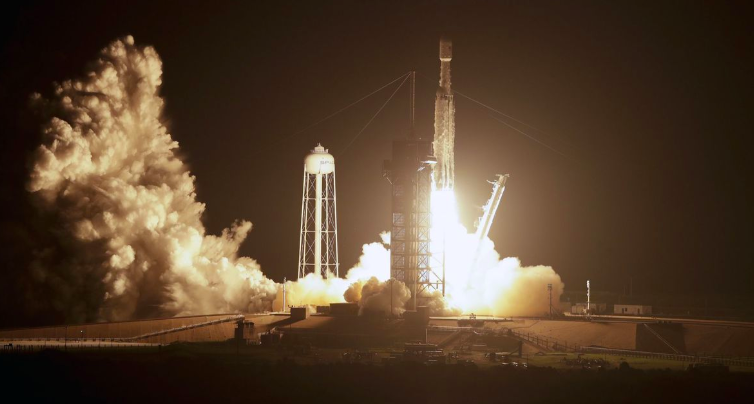
Falcon Heavy Takes Off Photo: John Raoux, Associated Press
by Alexandra Patel and Monica Medina
Overnight on Tuesday, Elon Musk’s company SpaceX launched its Falcon Heavy Rocket blasted off from Kennedy Space Center in Florida with loud sonic booms and managed to successfully land two of its launch vehicles on landing pads at Cape Canaveral Air Force Station, though the third booster rocket crashed into the ocean. This is an experimental mission for the U.S. Air Force, and Musk deemed it to be the “most difficult launch ever,” with a payload of two dozen satellites and spacecraft for the Department of Defense, NASA, NOAA and the non-profit organization The Planetary Society.
Why This Matters: The launch on Tuesday reignited an excitement over space exploration that has not been seen since the 1960’s space race. Even more notable is that this launch revolutionized access to space by showing that rockets can be effectively reused. It has demonstrated that sustainability is not just a buzzword used on earth, but a manner of thinking that spans far beyond our own atmosphere and can lead to amazing innovation. It also shows that public-private partnerships work when it comes to putting important government satellites into space and private companies can deliver for the government and do it at a lower cost. When I (Monica) was at NOAA, we struggled with putting our weather satellites into space on time and on budget.
Going Green In Space: Among the NASA payload was the Green Propellant Infusion Mission, which will test a cleaner, safer and more efficient fuel alternative to the commonly used hydrazine. The payload also included an “atomic clock” that functions as a Global Positioning System for satellites orbiting Earth — atomic clocks help precisely triangulate distances traveled over periods of time. Among the NOAA satellites, six make up the COSMIC-2 mission, which aims to monitor the temperature, pressure and moisture of the atmosphere across the tropics — data that will help meteorologists improve hurricane and tropical storm modeling.
Reuse Recycle: Space travel has never been cheap, but SpaceX is pushing the boundaries to substantially reduce the cost of space access by being the first ever to reuse rockets. Launch vehicles, consisting of rocket boosters and fuel tanks, have been historically irretrievable and have ended up either burning away in the atmosphere or sinking to the bottom of the ocean. SpaceX, however, was able to retrieve the nosecone of the Falcon Heavy’s rocket as it came back down to earth, allowing it to be reused for space travel in the future.
June 26, 2019 » atomic clock, Elon Musk, NASA, NOAA, satellites, SpaceX, The Planetary Society


